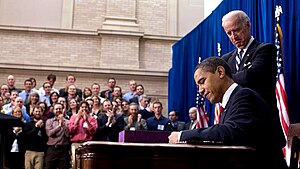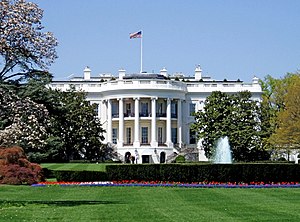 Image via Wikipedia
Image via WikipediaObama says it’s only ‘fair’ to raise taxes on the rich. He’s wrong.
By Arthur C. Brooks, Published: April 22 at The Washington Post
President Obama’s criticisms of the Republican budget proposal put forward by Rep. Paul Ryan of Wisconsin center on one main objection: It is unfair.
The Ryan plan is based on three premises. First, our economy is headed for a predictable disaster because of the ruinous levels of government spending. (Standard & Poors’ decision this week to downgrade its outlook for U.S. debt only confirms this worry.) Second, we already have one of the highest corporate tax rates in the world, and we can’t load more income taxes onto entrepreneurs without expecting collateral harm to jobs and economic growth. Third, therefore, we must cut spending and reform entitlements, and this would necessarily affect the nearly 70 percent of Americans who take more from the government than they pay in taxes.
The president isn’t buying it. “There’s nothing serious about a plan that claims to reduce the deficit by spending a trillion dollars on tax cuts for millionaires and billionaires,” he said in a speech on April 13. Knowing that some polls show support for tax increases, he also complained that, over the past decade, “the top 1 percent saw their income rise by an average of more than a quarter of a million dollars each. And that’s who needs to pay less taxes?” And in his town hall meeting Wednesday, he called for a tax code that is “fair and simple,” proposed spending cuts that are “fair” and ask for shared responsibility, and concluded that he wants to “live in a society that’s fair.”
While conservatives have criticized the economic principles and class-baiting cadences of Obama’s budget rhetoric, no one has answered his fundamental charge that the Ryan plan is unfair. Conservatives have long stayed away from fairness debates, preferring to build unemotional arguments on the right angles of economic efficiency. This is a lost opportunity. Advocates for limited government can win the fairness argument in a walk.
For years, economists have conducted experiments to study attitudes about economic fairness. One such experiment is the “ultimatum game.” Two strangers are asked to split $10. One is given the $10 and instructed to choose how much to offer the other. Say you and I are the players, and I offer you $3, meaning I would keep $7 for myself. If you accept my offer, we both keep the respective amounts. If you reject it, we both leave empty-handed.
Economic theory predicts that you should accept any positive offer — even one penny — because it’s better than nothing. But, of course, that’s wrong. If the offer seems too unfair, you’ll walk away out of spite and punish me for my selfishness. In the United States, games like this have an average offer of about $4, and offers are accepted about 85 percent of the time.
Note that merit is not part of the experiment; nobody earned the $10. When we bring merit into the mix, the results change. Another experiment shows this by asking subjects to imagine they are lying on a hot beach, craving a cold beer. Would they be willing to pay more, less or the same for their favorite beer if it were purchased from an upscale resort hotel versus from a run-down grocery store?








